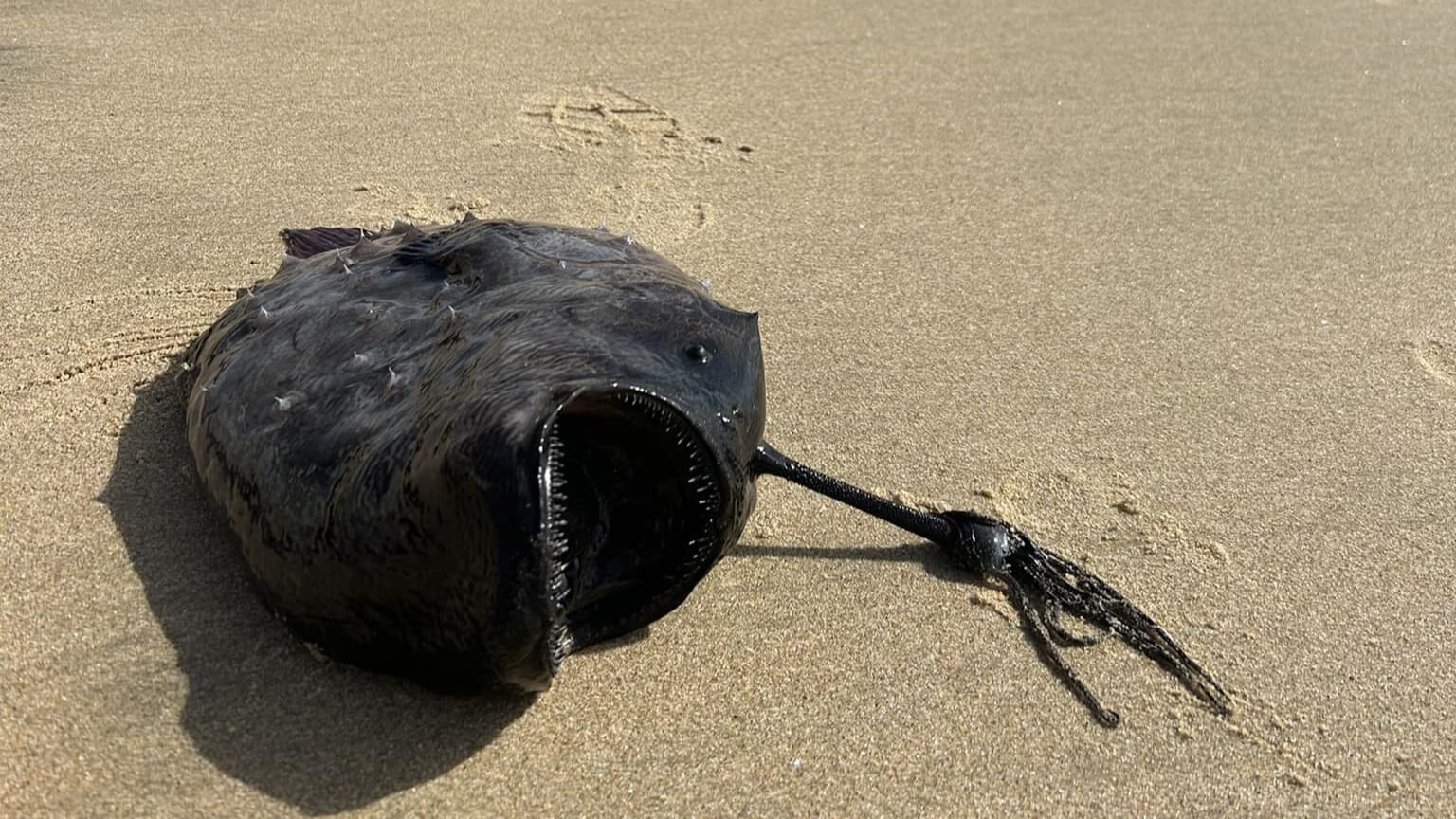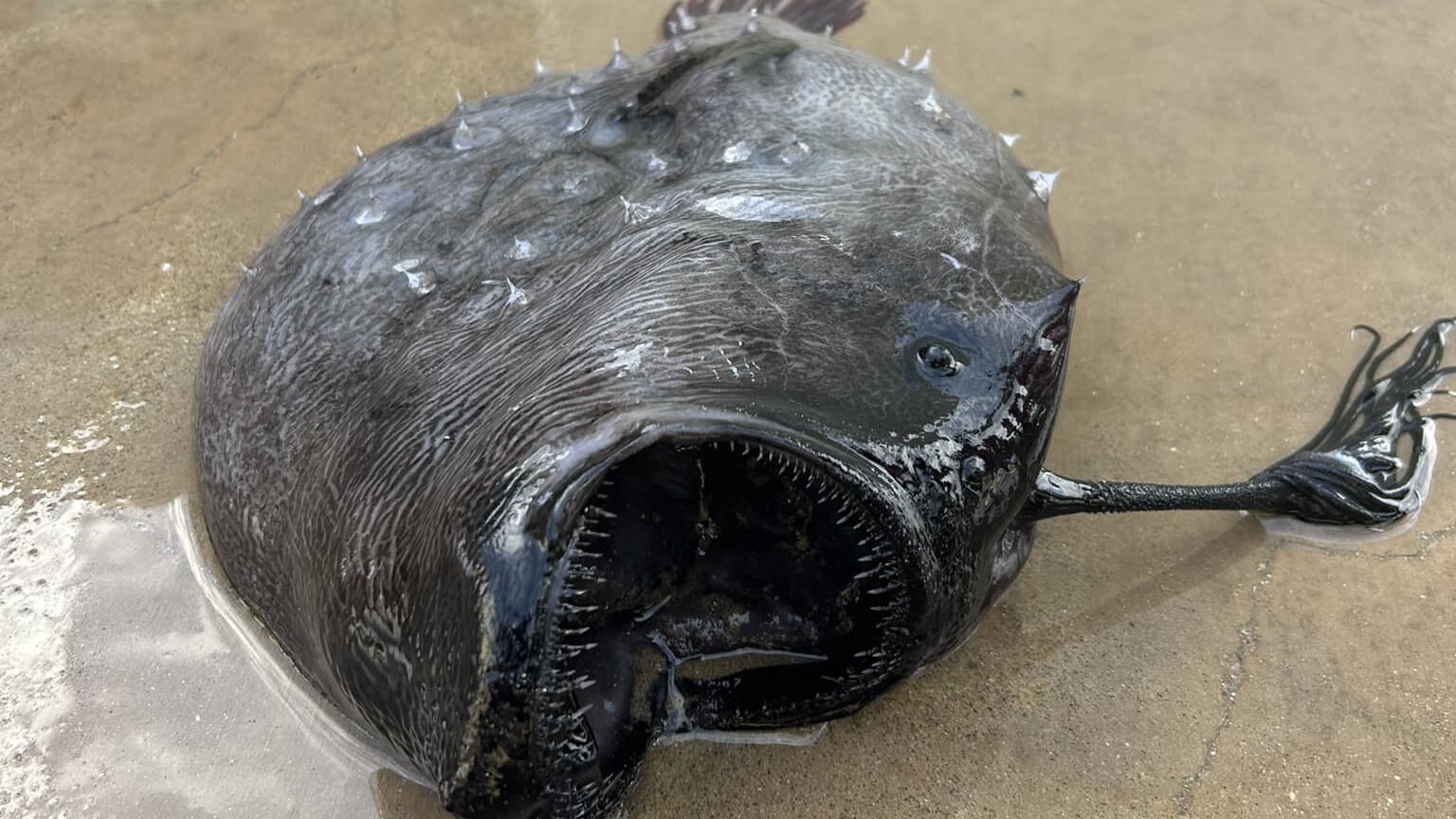
A Jet-Black, Bioluminescent ‘Football Fish’ Washed Up On A California Beach
A deep-sea Pacific football-fish found on Moro Beach in Crystal Cove State Park is the second of this species to wash up in recent years, but the reason behind the strandings remains a mystery.
By: Sascha Pare | Live Science
A ghoulish, pitch-black fish with a long stalk on its head recently washed up on a beach in Southern California — the second of its kind to end up onshore there in recent years, Crystal Cove State Park officials announced Oct. 17.
Experts identified the bizarre-looking animal as a female Pacific football-fish (Himantolophus sagamius), a species of anglerfish that lives in the Pacific Ocean at depths of 2,000 to 3,300 feet (600 to 1,000 meters). It follows an earlier stranding in May 2021, when a visitor at the state park discovered another fish of the same species on the shore.
“To see an actual anglerfish intact is very rare and it is unknown how or why these fish ended up onshore,” Crystal Cove State Park officials wrote in a Facebook post. “Their teeth, like pointed shards of glass, are transparent and their large mouth is capable of sucking up and swallowing prey the size of their own body.”
Pacific football-fish are one of more than 300 species of anglerfish living in the deep sea worldwide, according to the California Academy of Sciences. Female anglerfish can grow up to 24 inches (61 centimetres) long — about 10 times as large as some of their male counterparts, which have evolved to latch onto females and act as lifelong parasitic providers of sperm on-tap.
“Only females possess a long stalk on the head with bioluminescent tips used as a lure to entice prey,” park officials wrote in the post. The males of some species merge their bloodstreams with their host’s, “eventually coalescing with the female until nothing is left of their form but their testes for reproduction,” they added.

A seasonal lifeguard discovered the dead anglerfish on Moro Beach close to the lifeguard headquarters, “just in time for Friday the 13th,” the officials wrote. It was later picked up by the California Department of Fish and Wildlife for analysis.
Fossilized Fish Discovered On The High Altitude Himalayas!
The specimen measured about 14 inches (36 cm) from mouth to tail fin, Michelle Horeczko, a senior environmental scientist supervisor with the Department of Fish and Wildlife, told the Los Angeles Times. Only 30 or so specimens of this species have been collected globally, she said, so the discovery will provide valuable information about the life of Pacific football-fish.
After examining the fish, scientists handed it over to the Natural History Museum in Los Angeles, where the Pacific football-fish discovered in 2021 is also housed, “so that the specimen can be preserved and available for scientific research,” Horeczko said.
While the reason for the stranding remains a mystery, “seeing this strange and fascinating fish is a testament to the curious diversity of marine life lurking below the water’s surface in California’s marine protected areas,” the Facebook post said.
* * *
NEXT UP!
Orca Rams Into Yacht Near Scotland, Suggesting The Behaviour May Be Spreading
Orcas have been ramming into ships off the coasts of Spain and Portugal and making headlines worldwide, but until now, the behaviour appeared contained to that one population. Last week, however, one of these black-and-white mammals slammed into a yacht between Scotland and Norway, some 2,000 miles away from the Iberian orcas.
Though scientists don’t quite know what to make of the recent incident, they say it might mean the behaviour is spreading. This is believed to be the first known orca-boat encounter in northern waters, as Philip Hoare and Jeroen Hoekendijk report for the Guardian.
On June 19, Dutch sailor Wim Rutten spotted an orca in the waters of the North Sea while traveling east from the Shetland Islands of Scotland. Rutten, 72, was using a single line off the back of the boat to fish for mackerel, when seemingly out of nowhere, the orca rammed into the stern of his seven-ton, aluminium hull yacht.
* * *
READ MORE: Scientists Finally Figure Out Why The Water Bear Is Nearly Indestructible
Interesting! Octopuses Can Rewire Their Brains To Brave Chilly Waters
Telegram: Stay connected and get the latest updates by following us on Telegram!
We’d love to hear from you! If you have a comment about this article or if you have a tip for a future Collective Spark Story please let us know below in the comment section.
